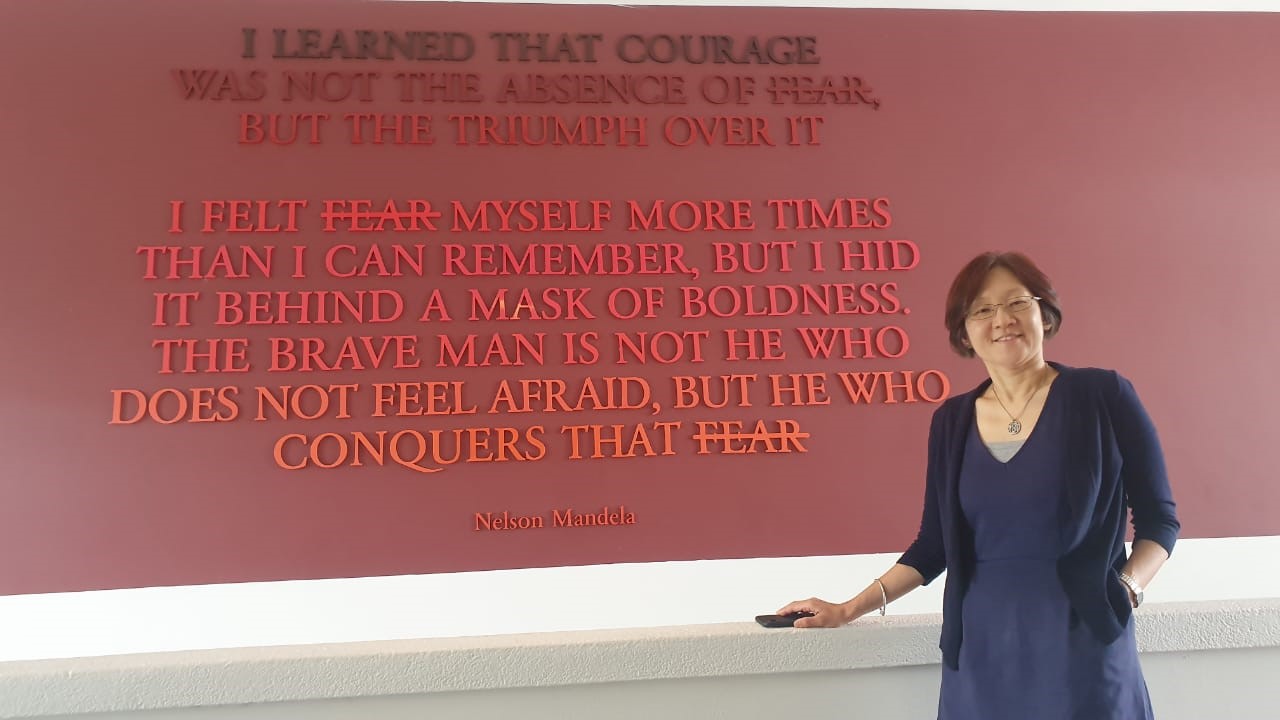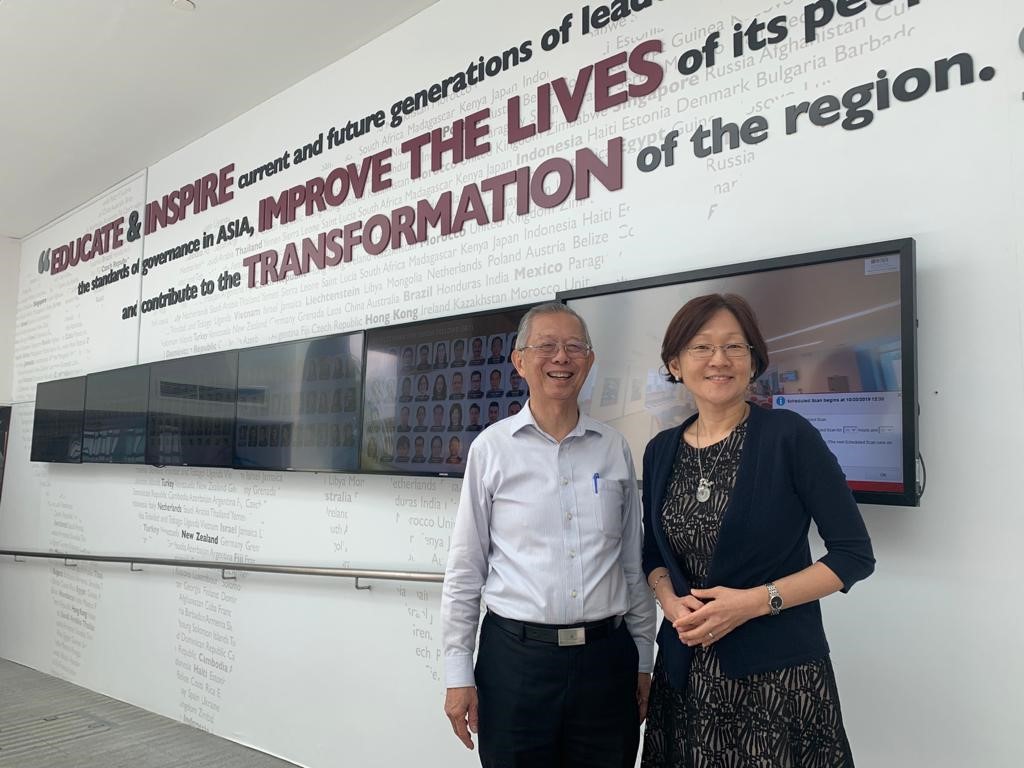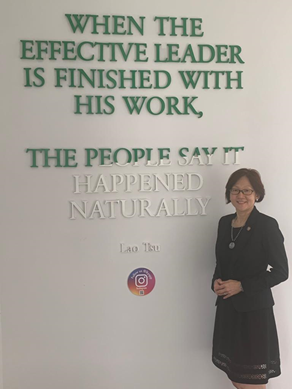What does it mean to be a woman in technology? It’s about embracing change and letting curiosity lead the way, says Senior Fellow and World Bank Senior Technology Advisor Lesly Goh. “Because I’m always curious,” she says, “I have no shortage of areas I want to explore, to push the boundaries of conventional wisdom!”
Currently based in Washington, D.C., with plans to relocate to Indonesia, Lesly is on a fresh mission to “make agriculture cool again” in the East Asia Pacific region. She brings to the table her extensive experience in fintech, regulatory technology, and government digitalisation, which spans across the private and public sectors.
Interestingly, agriculture is both a new frontier for Lesly, and a subject close to her heart. Read on for Lesly’s story, in her own words.

As a Senior Technology Advisor at the World Bank, I work with developing countries to embrace new technology. To use an Asian analogy, I see my role as being similar to the ancient Chinese strategist Zhuge Liang. I’m someone who works behind the scenes to provide insights for navigating around the curve, and I help governments and policymakers prepare for what the future might bring with the promise of technology innovations.
[ALUMNI-INFO TEXT="In my younger days, I felt like I had something to prove, but not anymore. Now, the questions that I ask are: Does it have a higher purpose? Does that strike a chord with what I believe in, which is technology and social impact? And how can I, through my work, help drive empowerment of the underserved such as women and the poor?
This is a story that I seldom tell, but when I left my birth country of Singapore after a tumultuous childhood and arrived in America as a teenager, I had my first encounter with agriculture. I was 18, I had no family support, and I was homeless. After receiving social protection, I was given shelter on a cattle farm in Florida for several months. I will never forget that I was in this promised land, completely broke, and broken in the soul. I am grateful that the rural community of America took me in and gave me a roof over my head, as well as a new perspective.
During my time living and working on the farm, I learned about rearing livestock and growing staple crops. Beyond that, I had a glimpse of living close to nature and going back to the basics, where it’s about humanity and empathy for those in need.
At the time, I had other plans for my future, but I thought to myself, one day when I have a chance, I’ll come back to agriculture."][/ALUMNI-INFO]
A Labour Of Love
Subsequently, I received a scholarship to study computer engineering and mathematics, and I began my journey as a woman in technology.
[ALUMNI-QUOTES TEXT="The seeds for my return to agriculture were planted in 2015, when my work with Microsoft brought me back to Singapore for three years. As Microsoft’s Financial Services Lead in Asia, part of my role involved the digital transformation of agriculture and rural banks in Thailand and the Philippines—these are banks that provide financing to smallholder farmers. This helped me to understand how technology enables access to much-needed capital that could make a difference to smallholder farmers. I was also inspired by the book “How Asia Works” by business journalist Joe Studwell, where he suggested that successful Asian nations had developed rapidly because they created conditions for labour-intensive smallholder farms to thrive.
I believe in karma, and this year, another opportunity in agriculture came knocking, when my colleague at the World Bank asked me, “What can technology do for agriculture?”
I love a good challenge, and during the pandemic, I had the time to dive deep into issues affecting the agriculture supply chain, and learn from global experts and ASEAN innovators in the sustainable agricultural technology space, also known as “agtech.” Agtech solutions span across the entire value chain, ranging from mobile apps and e-commerce platforms to market intelligence that bridges the gap between farmers and consumers. The adoption of agtech could transform agriculture, and even encourage a new generation of farmers to emerge."][/ALUMNI-QUOTES]
Why did I devote much of my year to working on the application of technology in agriculture? COVID-19 surfaced the weaknesses in the agri-food system, but at the same time, presented an unprecedented opportunity to transform the system. Perhaps, it is my way of giving back to a community that had helped me when I most needed it, by doing what I do best, which is understanding the challenges and finding novel solutions where technology could be impactful.
Due to my agtech research, I was given the honour of contributing to a Brookings Institute book project on breakthrough technologies that can drive progress towards the world’s Sustainable Development Goals. The book will be published in 2021, and my chapter is on the digital transformation of agriculture in the East Asia Pacific region, where agriculture is still primarily labour-intensive and low-income work. I focus on disruptive technologies and innovations in agriculture that will enable farmers and agri-entrepreneurs to increase their productivity, efficiency, and competitiveness. These include technologies that can improve nutritional outcomes, increase access to market, and enhance resilience to climate change.
To wrap up 2020, I shared some of my findings at a Columbia SIPA panel discussion and a “Smart Agriculture” forum organised by Chinese e-commerce giant Pinduoduo and the China Agricultural University.
Rebuilding A Better Future
The COVID-19 lockdown has made me reflect on the leadership lessons that I learned at the Lee Kuan Yew Senior Fellowship in Public Service (SFPS) programme in Singapore in 2019. We had illuminating discussions with leaders such as Professor Lim Siong Guan, former head of Singapore’s civil service. Prof Lim left a deep impression when he talked about transcendence leadership, where you help others to self-actualise by empowering them to be the best they can be.

Caption: Lesly with Professor Lim Siong Guan during the SFPS programme.
In my own capacity as a leader, I’ve realised that there are many ways through which a person can lead, and someone with depth and breadth of knowledge in a given domain may find greater fulfillment in being a thought leader. We also need to acknowledge quiet leadership, especially for Asian women leaders who tend to be less vocal and more action-oriented. Ultimately, leadership is about having a higher purpose to make a difference for a better world.

Looking back, the intention of the SFPS programme was to bring together senior leaders from different countries, in order to build organic partnerships over time. COVID-19 gave us the perfect opportunity to put this into practice—those of us from the inaugural batch are still in touch, and we came together to compare notes on the government responses in our respective countries, and to render assistance where needed. I think the SFPS programme is a brilliant way of placing leaders with diverse backgrounds in a programme to foster cross-border understanding and authentic friendships, so that when crises happen, we are better equipped to come to each other’s aid.
Being part of the SFPS programme, as well as serving on the board of directors for the Singapore Government Technology Agency (GovTech), has given me greater insight into Singapore’s pragmatic leadership, which proved its mettle during COVID-19. The Singapore government provided essential and timely information as COVID-19 was unfolding, and we saw their commitment to transparency, and willingness to stand up to public scrutiny. When Professor Mitchell Weiss from Harvard Business School, prominent for his research on public entrepreneurship, reached out to me about his case study on Singapore’s contact tracing—which I knew quite a few countries were interested in—I was happy to share my knowledge, and connected him with key stakeholders.
Another development that I’ll be paying attention to is Singapore’s “30 by 30” vision to enhance its food security and sustainability. The plan is to increase local food production from 10 percent of its total needs to 30 percent by 2030. I think it’s a bold ambition, but this is Singapore, where remarkable things can happen when you dare to dream!
But above all, I am inspired by the World Economic Forum’s “Great Reset” initiative. We have a narrow window of opportunity to reimagine and reset our world to make it more equitable for everyone. As we plan for the path to recovery from the pandemic, let’s look deeper to redefine our social contract, and our responsibility to future generations. Now is the time for global collaborations, so that we can create a more resilient, inclusive, and sustainable future for all.